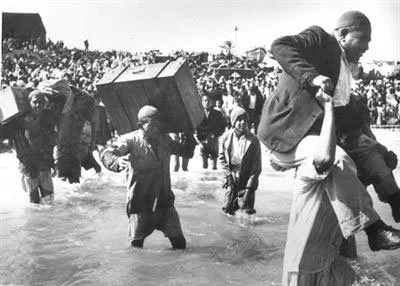76 years and 7 months
May 15th is the Palestinian Nakba Day (Day of the Catastrophe). On this day in 1948, they became refugees. palestinecampaign.org
Every year on May 15, we commemorate the atrocities of the Nakba, Arabic for catastrophe, during which more than 750,000 indigenous Palestinians were forcibly expelled from their homelands as a result of the Zionist pursuit of a Jewish ethno-state atop their homes in 1948. As Israel declared its independence on May 14, 1948, Zionist militias had been laying the groundwork for this ethnic cleansing by carrying out campaigns of terror against villages and cities across historic Palestine, leaving devastation and massacres in their wake, from Deir Yassin to Tantura. Those who fled this violence would become one of the largest refugee populations in the world, a population that continues to endure displacement today. As we mark these events amidst the backdrop of a seven-month-long genocide against Palestinians in Gaza, it’s more clear than ever that the Nakba never ended; its violence has persisted over the decades in the form of continued Israeli aggression and occupation, ethnic cleansing campaigns, house demolitions, the imprisonment of children, women, and men, and the persistent efforts to deny Palestinians any semblance of dignity, justice or self-determination.
These crimes have only become more blatant, more bold with every year Israel commits them with impunity. The genocide we are witnessing today has killed more than 35,000 Palestinians, with thousands more buried under the rubble of their homes. This genocide will reverberate across generations, through the tens of thousands of people whose bodies have been maimed by Israeli war machines, and through the echos of generations of families who have been wiped from existence. It would be easy to despair, 76 years into the Nakba, and seven months into a genocide livestreamed to our screens every day, but we cannot; we must not. Since 1948, Palestinians have persisted. They have remained steadfast in their liberation struggle, and so we, who stand in solidarity with them, must also remain steadfast.
What is unfolding in Palestine is not simply a humanitarian crisis. When Palestinians starve, it is because Israel is withholding food and other crucial supplies, it is because Israeli bulldozers destroy greenhouses and farms, because Israeli war machines have desecrated the land. It is because Israeli settlers set up camp at the borders to prevent and destroy aid destined for Gaza. When Palestinians die of easily treatable illnesses, it is because Israel has cut off access to medical supplies, has destroyed Gaza’s hospitals and medical infrastructure, and has restricted the movement of people in desperate need of medical care. When Palestinian homes are reduced to rubble, it is because Israeli war planes have continuously bombed them. With more than half of all of Gaza’s infrastructure destroyed, rebuilding them will take until at least 2040. These war crimes are an intentional act of destruction, an attempt to wipe Palestinians from existence.
Palestinians are not asking for our charity. What they need is solidarity and action. They need to be seen as more than victims over whom we grieve. They demand accountability from the governments that are complicit in reinforcing the systems of oppression that have allowed this genocide to continue unabated for seven months. They demand freedom. They demand justice. They demand, and deserve, our unwavering support as they rightfully resist Israeli oppression and violence.
The Palestine solidarity movement has offered hope. Anyone who has been active in the movement will know that what we are witnessing around the world marks a significant shift. We are seeing widespread and unrelenting actions in solidarity with Palestinians against their colonial oppressors in a way we have not seen before. The Student intifada, which began at Columbia University in New York and has since spread to campuses across North America and even here in Seoul, has emerged as an effective force in the boycott, divestment and sanctions movement, demanding their institutions end their complicity in genocide and divest from Israeli war crimes. But as solidarity grows, so does their repression by a system desperate to preserve the status quo. It has never been more clear that justice and liberation for Palestinians won’t come from governments or even international institutions; it will come from the collective power of the people around the world and in Palestine, who are carried by the knowledge that their struggle is a righteous one.
As we commemorate the Nakba and confront the atrocities unfolding in Gaza, let us reaffirm our commitment to solidarity and action. Let us pledge to stand with the Palestinian people in their quest for freedom, dignity, and justice with full-throated solidarity and an unwavering commitment to their liberation.
Palestine will free us all.

